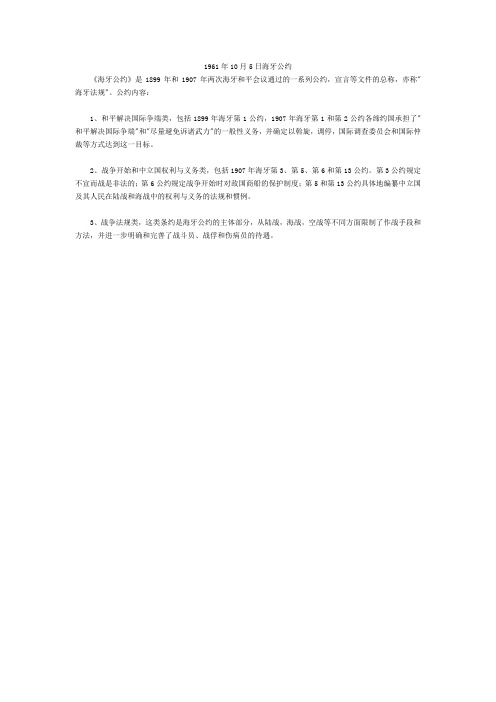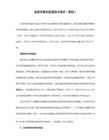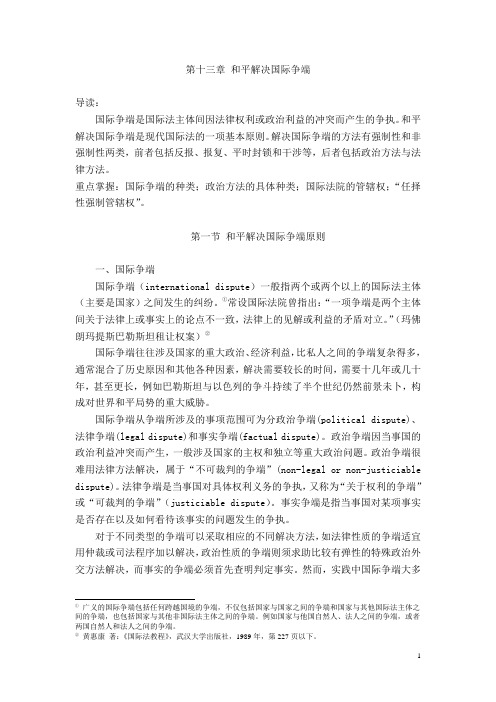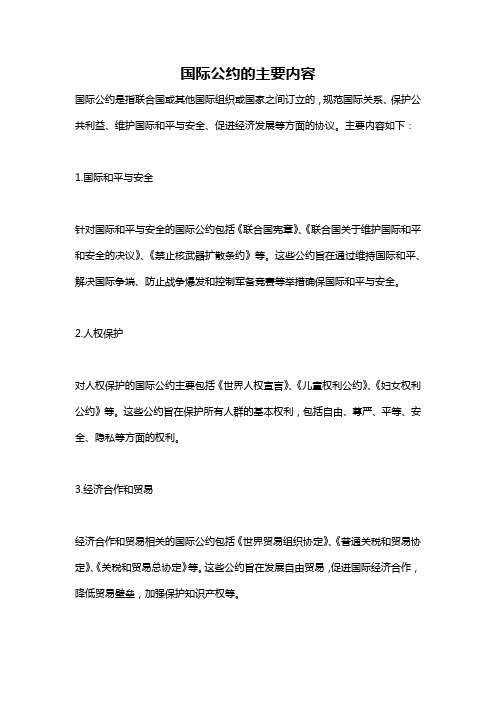和平解决国际争端公约
谈谈你对《非战公约》的认识。

谈谈你对《非战公约》的认识。
《非战公约》是全球反对战争的一项重要国际协议,旨在禁止侵略性战争和解决国际争端。
下面是关于《非战公约》的一些认识:
1.反对侵略和侵犯国家主权:《非战公约》的核心原则是反
对侵略和侵犯国家主权。
该公约要求各成员国在国际关系中以和平手段解决争端,并禁止使用武力对其他国家进行非法侵略。
2.维护和平与国际安全:《非战公约》旨在维护和平与国际
安全,促进国际合作和互信。
公约的签署方承诺不使用武力,通过和平外交手段解决纷争,并努力在国际事务中保持和平与稳定。
3.促进国际法和多边主义:《非战公约》奠定了国际法和多
边主义的基础。
公约规定各成员国应遵守国际法原则,并通过多边机制加强合作,推动互利共赢、共同发展的国际秩序。
4.防止战争危机和军备竞赛:《非战公约》的意义也在于减
少战争危机和防止军备竞赛。
公约的签署国承诺采取措施以减少军备和军事威胁,避免军备竞赛及其潜在的冲突可能性。
5.加强全球和地区安全框架:《非战公约》有助于加强全球
和地区的安全框架。
通过反对战争和侵略,公约成员国共
同致力于建立和发展一个更为安全和稳定的环境,维护全
球和地区的和平与安全。
尽管《非战公约》是一个重要的国际协议,但其实际约束力和执行力受到一系列复杂因素的制约。
尚存在着挑战和争议,如公约定义的战争概念、成员国的义务履行、特定情况下的国际干预等。
然而,无论如何,《非战公约》提供了一个重要的国际法律框架和宣示,旨在推动和平解决争端、妥善管理国际关系,为全球和平与稳定作出积极贡献。
二战后的国际公约

二战后的国际公约摘要:1.二战后的国际公约简介2.国际公约的目的与意义3.国际公约的主要内容4.国际公约对国际社会的影响5.我国与国际公约的关系正文:1.二战后的国际公约简介二战后,国际社会为了维护世界和平、防止战争重演,先后签订了一系列国际公约。
这些公约涉及范围广泛,包括人权、和平解决争端、战争法规等方面,对国际社会产生了深远影响。
2.国际公约的目的与意义国际公约的主要目的是维护国际和平与安全,促进国际合作,减少战争发生的可能性。
通过制定共同遵守的规则和准则,约束国家行为,降低国际冲突的风险。
同时,国际公约为各国提供了一个平台,共同讨论和解决国际问题,推动国际社会的发展和进步。
3.国际公约的主要内容国际公约的内容涵盖多个领域,主要包括以下方面:(1)人权方面:包括《世界人权宣言》、《公民权利和政治权利国际公约》等,旨在保障各国人民的基本人权和自由。
(2)和平解决争端:包括《联合国宪章》、《和平解决国际争端公约》等,规定了和平解决国际争端的原则和程序。
(3)战争法规:包括《战争法公约》、《日内瓦公约》等,对战争中的行为进行规范,以保护战争受害者的权益。
(4)国际合作:包括《世界贸易组织协定》、《国际刑事法院罗马规约》等,旨在促进国际经济、司法等领域的合作。
4.国际公约对国际社会的影响国际公约对国际社会产生了深远的影响,为各国间的交流与合作提供了依据和保障。
通过规范国家行为,降低了国际冲突的风险,为世界和平与繁荣做出了贡献。
5.我国与国际公约的关系我国一直积极参与国际公约的制定和执行,已加入多个国际公约,如《联合国宪章》、《世界人权宣言》等。
这些公约为我国发展国际关系、加强国际合作提供了法律依据和保障。
国际法与国际争端解决中的国际公约与条约

发达国家通常具有较高的法律意识和 国际责任感,能够较好地遵守和执行 国际公约和条约。
国际合作与援助
发达国家在国际合作和援助方面表现 积极,通过提供资金、技术和人才支 持等方式,协助发展中国家履行国际 义务。
发展中国家执行情况
遵守和执行情况有待提高
发展中国家由于经济、社会和历史等原因,在遵守和执行国际公约和条约方面 存在一定困难。
国际法促进了各国之间的国际合作和交流 ,推动了全球和平与发展事业的进步。
PART 03
国际公约、条约类型及其 内容
政治性公约与条约
领土与边界条约
规定国家间领土变更、 边界划定及边界争议解
决方式的条约。
外交关系条约
确立国家间外交关系、 规定外交特权与豁免的
条约。
军事同盟条约
国家间为共同防御而订 立的军事合作条约。
促进国际合作
国际法和国际公约鼓励国 家间的合作,共同应对全 球性挑战,如气候变化、 恐怖主义等。
推动经济发展
经济 的繁荣和发展。
推动全球治理体系变革,构建人类命运共同体
完善全球治理体系
国际法和国际公约是全球治理体 系的重要组成部分,通过加强其 制定和实施,可以推动全球治理
加强国际合作与援助
鼓励各国加强在国际法和国际公约领域的合作与援助,共同推动全 球治理体系的变革和完善。
完善国内法律制度
各国应完善国内法律制度,确保与国际法和国际公约保持一致,提 高执行能力和效率。
2023 WORK SUMMARY
THANKS
感谢观看
REPORTING
国际公约
国际公约是指国际法主体之间就权利义务关系缔结的一种书 面协议。国际公约可以是双边的,也可以是多边的,具有普 遍的约束力。
1961年10月5日海牙公约

1961年10月5日海牙公约
《海牙公约》是1899年和1907年两次海牙和平会议通过的一系列公约,宣言等文件的总称,亦称"海牙法规"。
公约内容:
1、和平解决国际争端类,包括1899年海牙第1公约,1907年海牙第1和第2公约各缔约国承担了"和平解决国际争端"和"尽量避免诉诸武力"的一般性义务,并确定以斡旋,调停,国际调查委员会和国际仲裁等方式达到这一目标。
2、战争开始和中立国权利与义务类,包括1907年海牙第
3、第5、第6和第13公约。
第3公约规定不宣而战是非法的;第6公约规定战争开始时对敌国商船的保护制度;第5和第13公约具体地编纂中立国及其人民在陆战和海战中的权利与义务的法规和惯例。
3、战争法规类,这类条约是海牙公约的主体部分,从陆战,海战,空战等不同方面限制了作战手段和方法,并进一步明确和完善了战斗员、战俘和伤病员的待遇。
非战公约的名词解释

非战公约的名词解释非战公约,又称为无战协议或和平公约,是指通过协商、谈判或其他和平手段达成的一种国际法律文件或政治协议,旨在实现国际社会的和平与安全。
非战公约在人类历史上扮演了重要的角色,不仅可以帮助各国避免冲突与暴力行为,更有助于维护国际社会的稳定与发展。
非战公约的主要目的是在冲突或争端爆发时,通过双方或多方之间的协议,禁止使用武力或军事手段来解决问题。
它的核心原则是非暴力、和平解决争端。
一旦各方同意签署了非战公约,他们就承诺不使用武力来解决争端,而通过对话、谈判、仲裁等和平手段来找到解决问题的途径。
在实践中,非战公约可以包括停火协议、停火条约、和平协议、军事禁令等形式。
非战公约的签署和履行有助于减少战争和暴力行为对人类社会的破坏。
通过此类公约,国际社会可以有效防止军事侵略、保护人权、维护和平秩序。
例如,二战结束后,联合国成立,签署了联合国宪章,其中包含了禁止使用武力的原则,倡导和平解决争端。
此外,各种国际组织和地区性组织也不断推动签署非战公约,以实现地区和平与稳定。
非战公约的实施不仅需要各国政府的共同努力,更需要全球公民的支持与积极参与。
公众的参与和支持有助于增强公约的权威和可信度,促使各国政府认真履行公约所规定的义务。
同时,公众的参与还可以推动各国政府通过倡导和平、宣传非暴力、加强教育等方式,加深人们对非战公约价值的理解和认同。
非战公约也与非暴力运动密切相关。
非暴力运动是一种通过和平手段来实现社会变革的行动方式。
它的历史可以追溯到20世纪初的印度独立运动,以及马丁·路德·金等领导的美国民权运动。
特别是在战后的世界,非暴力运动成为推动社会变革和消除种族歧视、贫困等问题的重要工具。
非战公约与非暴力运动的理念相通,都旨在通过和平手段来解决争端和问题。
然而,非战公约并非完美或普世。
因为国际关系复杂多变,各国主权等因素的影响,签署和履行非战公约面临着一些挑战。
有些国家可能不愿意签署或遵守公约,或者在实际操作中存在着困难。
和平解决国际争端公约

常设仲裁法院设在海牙。
国际事务局是法院的书记处;它为法院开庭担任通讯的媒介;它保管档案并处理一切行政事务。
各缔约国承允将它们之间达成的任何仲裁条件以及由特别法庭作出的有关裁决,以核证无误的副本尽速送交事务局。
各缔约国还承允将载明执行仲裁法院裁决的法律、规章和文件送交事务局。
第三十一条
委员会会议不得公开,调查的记录和文件均不予发表,但依据委员会在当事各方的同意下作出的决定在外。
第三十二条
在当事各方提出一切解释和证据以及所有证人已提供证据后,主席即宣告调查结束,委员会休会,以便讨论和起草报告。
第三十三条
报告由委员会全体委员签署。
委员会如有一人拒绝签字,应在报告上注明,但报告仍然有效。
第二十条
委员会有权在当事国同意下,临时迁移到它认为对此种调查方法有用的地方,或派一位或几位委员到那里。但必须取得进行此项调查的所在地国家的许可。
第二十一条
每一项调查和对现场的调查应在当事国代理人或律师出席下或在他们已被正式传唤以后进行。
第二十二条
委员会有权要求当事国一方或另一方提供它认为有益的那些解释或资料。
如各方认为有必要任命助理员,则调查专约应规定任命的方式及其职权的范围。
第十一条
如调查专约没有规定委员会的会址,委员会应设在海牙。
会址一经确定,除非当事各方同意,委员会不得变更。
如调查专约未规定使用的语言,则由委员会予以规定。
第十二条
调查委员会的组成,除另有规定外,应遵照本公约第四十五条和第五十七条的规定。
每一当事国任命两名仲裁人,其中只有一名可由本国国民充任或由该国从常设仲裁法院成员名单中选出一人充任,再由这些仲裁人共同选择一名公断人。
第十四章 武装冲突法

中国古代很早就形成了有关战争的规则, 如不追逃敌、不用诈术、不伐丧、不重伤、 不擒二毛等具体的交战规则和有关宣战、 媾和优待俘虏等规则。 埃及、巴比伦、印度、古希腊和罗马都有 关于作战规则的记载。例如,禁止使用暗 藏的武器、有倒钩的和有毒的武器,禁止 攻击逃跑的、投降的、放下武器的敌人, 禁止在饮水中下毒等。
1969年《维也纳条约法公约》和1977年 《禁止为军事或任何其他敌对目的使用改 变环境的技术的公约》等使用了“敌对行 为”一语。
二、武力的合法性 1.判断武力是否合法应依国际法; 2.现代国际法、或者说武装冲突法,禁止在 国际关系上使用武力,同时规定自卫作战 民族独立或民族解放战争,还有联合国采 取或授权的军事行动,都是合法的。 3.合法性的规定一般不适合一国国内的战争 和武装冲突。
(一)海牙公约体系 《和平解决国际争端公约》(1899年海牙第1公约)、 《陆战法规和惯例公约》(1899年海牙第2公约)及 附件《陆战法规和惯例章程》、《关于1864年8 月22日日内瓦公约的原则适用于海战的公约》 (1899年海牙第3公约)、《禁止从气球上或用其他 新的类似方法投掷投射物和爆炸物宣言》(1899年 海牙第1宣言)、《禁止使用专用于散布窒息性或 有毒气体的投射物的宣言》(1899年海牙第2宣言)、 《禁止使用在人体内易于膨胀或变形的投射物, 如外壳坚硬而未全部包住弹心或外壳上刻有裂纹 的子弹的宣言》(1899年海牙第3宣言) 。
为反映这种趋势,国际法也将传统战争法规扩大 到武装冲突的领域。也逐渐倾向于使用武装冲突 和武装冲突法。1949年日内瓦四公约共同第2条 规定:“本公约适用于两个或两个以上缔约国间 所发生之一切经过宣战的战争或任何其他武装冲 突,即使其中一方不承认有战争状态。”1954年 《关于发生战争和武装冲突时保护文化财产的公 约》,1961年《维也纳外交关系公约》,联合国 安理会有关设立前南国际法庭和卢旺达国际法庭 的决议,都使用了“武装冲突”术语。
新编国际法学第十二章 和平解决国际争端

特点
1、自愿管辖 2、自选仲裁人 3、可自选法律 4、裁决有效力
(二)国际仲裁制度
1、仲裁的法律根据 2、仲裁庭的组成
3、仲裁适用法律 4、仲裁程序 5、仲裁裁决
1、仲裁的法律根据
仲裁协议国际仲裁的基础和法律依据,内容 包括仲裁庭的组成、仲裁程序、裁决的效力、仲 裁地点和费用等。仲裁协议可以有三种方式:
2、组织
(1)法官 (2)专案法官 (3)秘书处
(1)法官
15人,不可同国籍; 安理会荐,大会选 不得同国国籍 任期9年 可连任; 不回避;
(2)专案法官(特别法官)
在法院受理案件中,如果一个当事国有 本国籍的法官,他方当事人也可以选派一人 作为“专案法官” 参加本案的审理。如果当 事双方都没有本国籍的法官,则双方都可各 选派一名“专案法官”参与该案件的审理。 这种临时的专案法官在该案审理中与正式法 官具有完全平等的权利。
(二)种类
1、政治性国际争端 2、法律性国际争端 3、混合型国际争端 4、事实争端
1、政治性国际争端
政治利益冲突而引起的争端,例如国家 主权和领土完整受到侵犯而引起的争端。
涉及国家主权,一般不适宜用法律裁判 的方法解决,故称为“不不可可裁裁判判的的争争端端”;
2、法律性国际争端
指法律利益冲突而引起的争端, 例如在条约适用和解释、划定边界走 向产生的争端。
(一)特点
1、组成:固定的、事先组成的 2、法官:选出,非指派 3、法律:国际法,非选择 4、判决:有拘束力,法院无强制执行权
(二)国际法院
1、概况 2、组织 3、职权
4、法律 5、程序 6、判决
1、国际法院简介
联合国主要司法机关。 1、宗旨:以和平方法且依正义及国际法之原则,调整或解决 足以破坏和平之国际争端或情势。 2、国际法院依照《规约》运作。1946年开始工作,取代 1920年在国际联盟主持下设立的常设国际法院。 3、地点:荷兰海牙和平宫。联合国六个主要机构中,国际 法院是唯一设在纽约以外的机构。 4、作用: 解决各国向其提交的法律争端,向联合国各机关 和专门机构提供法律咨询意见。
凯洛格白里安公约

凯洛格白里安公约
凯洛格白里安公约,也被称为非战公约。
这项公约是在1928年8月27日在巴黎签署的一项国际条约,全称为《关于废弃战争作为国家政策工具的普遍公约》。
它的主要发起者是法国外长阿里斯蒂德·白里安(Aristide Briand)和美国国务卿弗兰克·B·凯洛格(Frank B. Kellogg),因此也被称为凯洛格-白里安公约。
公约的核心内容是:
1.谴责战争解决争端:缔约国之间应谴责用战争来解决国际争端,并废弃战争
作为实施国家政策的工具。
2.和平解决争端:所有签字国之间的任何争端或冲突,不论其性质和起因,都
应通过和平方法加以解决。
3.禁止战争谋求利益:任何使用战争手段谋求利益的签字国,将不得享受公约
提供的益处。
值得一提的是,该公约反映了当时全球人民反对帝国主义战争、渴望和平的压力,以及资本主义世界内高涨的和平主义倾向。
它旨在通过国际合作与法律手段来维护世界和平,是国际法上重要的里程碑。
尽管公约的理想主义色彩浓厚,但它在实际执行中的效果受到了一定的限制,特别是在缺乏有效的国际机制来强制执行的情况下。
不过,它仍然是国际社会共同努力追求和平的象征,并对后来的国际关系和国际法发展产生了深远的影响。
和平解决国际争端公约1899年7月29日

Laws of War :Pacific Settlement of International Disputes (Hague I); 29 July1899Art 1Art 2Art 3Art 4Art 5Art 6Art 7Art 8Art 9 Art 10Art 11Art 12Art 13Art 14Art 15Art 16Art 17Art 18 Art 19Art 20Art 21Art 22Art 23Art 24Art 25Art 26Art 27 Art 28Art 29Art 30Art 31Art 32Art 33Art 34Art 35Art 36 Art 37Art 38Art 39Art 40Art 41Art 42Art 43Art 44Art 45 Art 46Art 47Art 48Art 49Art 50Art 51Art 52Art 53Art 54 Art 55Art 56Art 57Art 58Art 59Art 60Art 61 CONVENTION (I) FOR THE PACIFIC SETTLEMENT OF INTERNATIONALDISPUTES (HAGUE I) (29 July 1899)Entry into Force: 4 September 1900His Majesty the Emperor of Germany, King of Prussia; [etc.]:Animated by a strong desire to concert for the maintenance of the general peace;Resolved to second by their best efforts the friendly settlement of international disputes; Recognizing the solidarity which unites the members of the society of civilized nations;Desirous of extending the empire of law, and of strengthening the appreciation of international justice;Convinced that the permanent institution of a Court of Arbitration, accessible to all, in the midst of the independent Powers, will contribute effectively to this result;Having regard to the advantages attending the general and regular organization of arbitral procedure;Sharing the opinion of the august Initiator of the International Peace Conference that it is expedient to record in an international Agreement the principles of equity and right on which are based the security of States and the welfare of peoples;Being desirous of concluding a Convention to this effect, have appointed as their plenipotentiaries, to wit:[List of plenipotentiaries.]Who, after communication of their full powers, found in good and due form, have agreed on the following provisions:TITLE I. ON THE MAINTENANCE OF THE GENERAL PEACEArticle 1With a view to obviating, as far as possible, recourse to force in the relations between States, the Signatory Powers agree to use their best efforts to insure the pacific settlement of international differences.TITLE II. ON GOOD OFFICES AND MEDIATIONArticle 2In case of serious disagreement or conflict, before an appeal to arms, the Signatory Powers agree to have recourse, as far as circumstances allow, to the good offices or mediation of one or more friendly Powers.Article 3Independently of this recourse, the Signatory Powers recommend that one or more Powers, strangers to the dispute, should, on their own initiative, and as far as circumstances may allow, offer their good offices or mediation to the States at variance.Powers, strangers to the dispute, have the right to offer good offices or mediation, even during the course of hostilities.The exercise of this right can never be regarded by one or the other of the parties in conflict as an unfriendly act.Article 4The part of the mediator consists in reconciling the opposing claims and appeasing the feelings of resentment which may have arisen between the States at variance.Article 5The functions of the mediator are at an end when once it is declared, either by one of the parties to the dispute, or by the mediator himself, that the means of reconciliation proposed by him are not accepted.Article 6Good offices and mediation, either at the request of the parties at variance, or on the initiative of Powers strangers to the dispute, have exclusively the character of advice and never have binding force.Article 7The acceptance of mediation can not, unless there be an agreement to the contrary, have the effect of interrupting, delaying, or hindering mobilization or other measures of preparation for war.If mediation, occurs after the commencement of hostilities it causes no interruption to the military operations in progress, unless there be an agreement to the contrary.Article 8The Signatory Powers are agreed in recommending the application, when circumstances allow, of special mediation in the following form:In case of a serious difference endangering the peace, the States at variance choose respectively a Power, to whom they in trust the mission of entering into direct communication with the Power chosen on the other side, with the object of preventing the rupture of pacific relations.For the period of this mandate, the term of which, unless otherwise stipulated, cannot exceed thirty days, the States in conflict cease from all direct communication on the subject of the dispute, which is regarded as referred exclusively to the mediating Powers, who must use their best efforts to settle it.In case of a definite rupture of pacific relations, these Powers are charged with the joint task of taking advantage of any opportunity to restore peace.TITLE III. ON INTERNATIONAL COMMISSIONS OF INQUIRYArticle 9In differences of an international nature involving neither honor nor vital interests, and arising from a difference of opinion on points of fact, the Signatory Powers recommend that the parties, who have not been able to come to an agreement by means of diplomacy, should as far as circumstances allow, institute an International Commission of Inquiry, to facilitate a solution of these differences by elucidating the facts by means of an impartial and conscientious investigation.Article 10The International Commissions of Inquiry are constituted by special agreement between the parties in conflict.The Convention for an inquiry defines the facts to be examined and the extent of the Commissioners' powers.It settles the procedure.On the inquiry both sides must be heard.The form and the periods to be observed, if not stated in the inquiry Convention, are decided by the Commission itself.Article 11The International Commissions of Inquiry are formed, unless otherwise stipulated, in the manner fixed by Article 32 of the present convention.Article 12The powers in dispute engage to supply the International Commission of Inquiry, as fully as they may think possible, with all means and facilities necessary to enable it to be completely acquainted with and to accurately understand the facts in question.Article 13The International Commission of Inquiry communicates its Report to the conflicting Powers, signed by all the members of the Commission.Article 14The report of the International Commission of Inquiry is limited to a statement of facts, andhas in no way the character of an Arbitral Award. It leaves the conflicting Powers entire freedom as to the effect to be given to this statement.TITLE IV. ON INTERNATIONAL ARBITRATIONCHAPTER I. On the System of ArbitrationArticle 15International arbitration has for its object the settlement of differences between States by judges of their own choice, and on the basis of respect for law.Article 16In questions of a legal nature, and especially in the interpretation or application of International Conventions, arbitration is recognized by the Signatory Powers as the most effective, and at the same time the most equitable, means of settling disputes which diplomacy has failed to settle.Article 17The Arbitration Convention is concluded for questions already existing or for questions which may arise eventually.It may embrace any dispute or only disputes of a certain category.Article 18The Arbitration Convention implies the engagement to submit loyally to the Award.Article 19Independently of general or private Treaties expressly stipulating recourse to arbitration as obligatory on the Signatory Powers, these Powers reserve to themselves the right of concluding, either before the ratification of the present Act or later, new Agreements, general or private, with a view to extending obligatory arbitration to all cases which they may consider it possible to submit to it.CHAPTER II. On the Permanent Court of ArbitrationArticle 20With the object of facilitating an immediate recourse to arbitration for internationaldifferences, which it has not been possible to settle by diplomacy, the Signatory Powers undertake to organize a permanent Court of Arbitration, accessible at all times and operating, unless otherwise stipulated by the parties, in accordance with the Rules of Procedure inserted in the present Convention.Article 21The Permanent Court shall be competent for all arbitration cases, unless the parties agree to institute a special Tribunal.Article 22An International Bureau, established at The Hague, serves as record office for the Court.This Bureau is the channel for communications relative to the meetings of the Court.It has the custody of the archives and conducts all the administrative business.The Signatory Powers undertake to communicate to the International Bureau at The Hague a duly certified copy of any conditions of arbitration arrived at between them, and of any award concerning them delivered by special Tribunals.They undertake also to communicate to the Bureau the Laws, Regulations, and documents eventually showing the execution of the awards given by the Court.Article 23Within the three months following its ratification of the present Act, each Signatory Power shall select four persons at the most, of known competency in questions of international law, of the highest moral reputation, and disposed to accept the duties of Arbitrators. The persons thus selected shall be inscribed, as members of the Court, in a list which shall be notified by the Bureau to all the Signatory Powers.Any alteration in the list of Arbitrators is brought by the Bureau to the knowledge of the Signatory Powers.Two or more Powers may agree on the selection in common of one or more Members.The same person can be selected by different Powers.The Members of the Court are appointed for a term of six years. Their appointments canbe renewed.In case of the death or retirement of a member of the Court, his place shall be filled in accordance with the method of his appointment.Article 24When the Signatory Powers desire to have recourse to the Permanent Court for the settlement of a difference that has arisen between them, the Arbitrators called upon to form the competent Tribunal to decide this difference, must be chosen from the general list of members of the Court.Failing the direct agreement of the parties on the composition of the Arbitration Tribunal, the following course shall be pursued:Each party appoints two Arbitrators, and these together choose an Umpire.If the votes are equal, the choice of the Umpire is in trusted to a third Power, selected by the parties by common accord.If an agreement is not arrived at on this subject, each party selects a different Power, and the choice of the Umpire is made in concert by the Powers thus selected.The Tribunal being thus composed, the parties notify to the Bureau their determination to have recourse to the Court and the names of the Arbitrators.The Tribunal of Arbitration assembles on the date fixed by the parties.The Members of the Court, in the discharge of their duties and out of their own country, enjoy diplomatic privileges and immunities.Article 25The Tribunal of Arbitration has its ordinary seat at The Hague.Except in cases of necessity, the place of session can only be altered by the Tribunal with the assent of the parties.Article 26The International Bureau at The Hague is authorized to place its premises and its staff atthe disposal of the Signatory Powers for the operations of any special Board of Arbitration.The jurisdiction of the Permanent Court, may, within the conditions laid down in the Regulations, be extended to disputes between non-Signatory Powers, or between Signatory Powers and non-Signatory Powers, if the parties are agreed on recourse to this Tribunal.Article 27The Signatory Powers consider it their duty, if a serious dispute threatens to break out between two or more of them, to remind these latter that the Permanent Court is open to them.Consequently, they declare that the fact of reminding the conflicting parties of the provisions of the present Convention, and the advice given to them, in the highest interests of peace, to have recourse to the Permanent Court, can only be regarded as friendly actions.Article 28A Permanent Administrative Council, composed of the Diplomatic Representatives of the Signatory Powers accredited to The Hague and of the Netherland Minister for Foreign Affairs, who will act as President, shall be instituted in this town as soon as possible after the ratification of the present Act by at least nine Powers.This Council will be charged with the establishment and organization of the International Bureau, which will be under its direction and control.It will notify to the Powers the constitution of the Court and will provide for its installation.It will settle its Rules of Procedure and all other necessary Regulations.It will decide all questions of administration which may arise with regard to the operations of the Court.It will have entire control over the appointment, suspension or dismissal of the officials and employ s of the Bureau.It will fix the payments and salaries, and control the general expenditure.At meetings duly summoned the presence of five members is sufficient to render valid the discussions of the Council. The decisions are taken by a majority of votes.The Council communicates to the Signatory Powers without delay the Regulationsadopted by it. It furnishes them with an annual Report on the labors of the Court, the working of the administration, and the expenses.Article 29The expenses of the Bureau shall be borne by the Signatory Powers in the proportion fixed for the International Bureau of the Universal Postal Union.CHAPTER III. On Arbitral ProcedureArticle 30With a view to encourage the development of arbitration, the Signatory Powers have agreed on the following Rules which shall be applicable to arbitral procedure, unless other rules have been agreed on by the parties.Article 31The Powers who have recourse to arbitration sign a special Act (compromise), in which the subject of the difference is clearly defined, as well as the extent of the Arbitrators' powers. This Act implies the undertaking of the parties to submit loyally to the award.Article 32The duties of Arbitrator may be conferred on one Arbitrator alone or on several Arbitrators selected by the parties as they please, or chosen by them from the members of the permanent Court of Arbitration established by the present Act.Failing the constitution of the Tribunal by direct agreement between the parties, the following course shall be pursued:Each party appoints two arbitrators, and these latter together choose an Umpire.In case of equal voting, the choice of the Umpire is instructed to a third Power, selected by the parties by common accord.If no agreement is arrived at on this subject, each party selects a different Power, and the choice of the Umpire is made in concert by the Powers thus selected.Article 33When a Sovereign or the Chief of a State is chosen as Arbitrator, the arbitral procedure issettled by him.Article 34The Umpire is by right President of the Tribunal.When the Tribunal does not include an Umpire it appoints its own President.Article 35In case of the death, retirement, or disability from any cause of one of the Arbitrators, his place shall be filled in accordance with the method of his appointment.Article 36The Tribunal's place of session is selected by the parties. Failing this selection the Tribunal sits at The Hague. The place thus fixed cannot, except in case of necessity, be changed by the Tribunal without the assent of the parties.Article 37The parties have the right to appoint delegates or special agents to attend the Tribunal, for the purpose of serving as intermediaries between them and the Tribunal.They are further authorized to retain, for the defense of their rights and interests before the Tribunal, counsel or advocates appointed by them for this purpose.Article 38The Tribunal decides on the choice of languages to be used by itself, and to be authorized for use before it.Article 39As a general rule the arbitral procedure comprises two distinct phases: preliminary examination and discussion.Preliminary examination consists in the communication by the respective agents to the members of the Tribunal and to the opposite party of all printed or written Acts and of all documents containing the arguments invoked in the case. This communication shall be made in the form and within the periods fixed by the Tribunal in accordance with Article 49.Discussion consists in the oral development before the Tribunal of the arguments of the parties.Article 40Every document produced by one party must be communicated to the other party.Article 41The discussions are under the direction of the President.They are only public if it be so decided by the Tribunal, with the assent of the parties.They are recorded in the prores-verb-aux drawn up by the Secretaries appointed by the President. These proc s-verb-aux alone have an authentic character.Article 42When the preliminary examination is concluded, the Tribunal has the right to refuse discussion of all fresh Acts or documents which one party may desire to submit to it without the consent of the other party.Article 43The Tribunal is free to take into consideration fresh Acts or documents to which its attention may be drawn by the agents or counsel of the parties.In this case, the Tribunal has the right to require the production of these Acts or documents, but is obliged to make them known to the opposite party.Article 44The Tribunal can, besides, require from the agents of the parties the production of all Acts, and can demand all necessary explanations. In case of refusal, the Tribunal takes note of it.Article 45The agents and counsel of the parties are authorized to present orally to the Tribunal all the arguments they may think expedient in defence of their case.Article 46They have the right to raise objections and points. The decisions of the Tribunal on those points are final, and can not form the subject of any subsequent discussion.Article 47The members of the Tribunal have the right to put questions to the agents and counsel of the parties, and to demand explanations from them on doubtful points.Neither the questions put nor the remarks made by members of the Tribunal during the discussions can be regarded as an expression of opinion by the Tribunal in general, or by its members in particular.Article 48The Tribunal is authorized to declare its competence in interpreting the compromise as well as the other Treaties which may be invoked in the case, and in applying the principles of international law.Article 49The Tribunal has the right to issue Rules of Procedure for the conduct of the case, to decide the forms and periods within which each party must conclude its arguments, and to arrange all the formalities required for dealing with the evidence.Article 50When the agents and counsel of the parties have submitted all explanations and evidence in support of their case, the President pronounces the discussion closed.Article 51The deliberations of the Tribunal take place in private. Every decision is taken by a majority of members of the Tribunal.The refusal of a member to vote must be recorded in the proc猫s-verbal.Article 52The award, given by a majority of votes, is accompanied by a statement of reasons. It is drawn up in writing and signed by each member of the Tribunal.Those members who are in the minority may record their dissent when signing.The award is read out at a public meeting of the Tribunal, the agents and counsel of the parties being present, or duly summoned to attend.Article 54The award, duly pronounced and notified to the agents of the parties at variance, puts an end to the dispute definitively and without appeal.Article 55The parties can reserve in the compromise the right to demand the revision of the award.In this case, and unless there be an agreement to the contrary, the demand must be addressed to the Tribunal which pronounced the award. It can only be made on the ground of the discovery of some new fact calculated to exercise a decisive influence on the award, and which, at the time the discussion was closed, was unknown to the Tribunal and to the party demanding the revision.Proceedings for revision can only be instituted by a decision of the Tribunal expressly recording the existence of the new fact, recognizing in it the character described in the foregoing paragraph, and declaring the demand admissible on this ground.The compromis fixes the period within which the demand for revision must be made.Article 56The award is only binding on the parties who concluded the compromise.When there is a question of interpreting a Convention to which Powers other than those concerned in the dispute are parties, the latter notify to the former the compromise they have concluded. Each of these Powers has the right to intervene in the case. If one or more of them avail themselves of this right, the interpretation contained in the award is equally binding on them.Article 57Each party pays its own expenses and an equal share of those of the Tribunal.General provisionsThe present Convention shall be ratified as speedily as possible.The ratifications shall be deposited at The Hague.A proc猫s-verbal shall be drawn up recording the receipt of each ratification, and a copy duly certified shall be sent, through the diplomatic channel, to all the Powers who were represented at the International Peace Conference at The Hague.Article 59The non-Signatory Powers who were represented at the International Peace Conference can adhere to the present Convention. For this purpose they must make known their adhesion to the Contracting Powers by a written notification addressed to the Netherlands Government, and communicated by it to all the other Contracting Powers.Article 60The conditions on which the Powers who were not represented at the International Peace Conference can adhere to the present Convention shall form the subject of a subsequent Agreement among the Contracting Powers.Article 61In the event of one of the High Contracting Parties denouncing the present Convention, this denunciation would not take effect until a year after its notification made in writing to the Netherlands Government, and by it communicated at once to all the other Contracting Powers.This denunciation shall only affect the notifying Power.In faith of which the Plenipotentiaries have signed the present Convention and affixed their seals to it.Done at The Hague, the 29th July, 1899, in a single copy, which shall remain in the archives of the Netherlands Government, and copies of it, duly certified, be sent through the diplomatic channel to the Contracting Powers.[List of Signatories]ReservationsUnited StatesUnder reservation of the declaration made at the plenary sitting of the Conference on the 25th of July, 1899.Extract from the prices-verbal:Nothing contained in this convention shall be so construed as to require the United States of America to depart from its traditional policy of not intruding upon, interfering with, or entangling itself in the political questions of policy or internal administration of any foreign state; nor shall anything contained in the said convention be construed to imply a relinquishment by the United States of America of its traditional attitude toward purely American questions.RomaniaUnder the reservations formulated with respect to Articles 16, 17 and 19 of the present Convention (15, 16 and 18 of the project presented by the committee on examination) and recorded in the proc猫s-verbal of the sitting of the Third Commission of July 20, 1899.Extract from the proc猫s-verbal:The Royal Government of Romania, being completely in favor of the principle of facultative arbitration, of which it appreciates the great importance in international relations, nevertheless does not intend to undertake, by Article 15, an engagement to accept arbitration in every case there provided for, and it believes it ought to form express reservations in that respect.It can not therefore vote for this article, except under that reservation.The Royal Government of Romania declares that it can not adhere to Article 16 except with the express reservation, entered in the proc猫s-verbal, that it has decided not to accept, in any case, an international arbitration for disagreements or disputes previous to the conclusion of the present Convention.The Royal Government of Romania declares that in adhering to Article 18 of the Convention, it makes no engagement in regard to obligatory arbitration.SerbiaUnder the reservation recorded in the proc猫s-verbal of the Third Commission of July 20, 1899. Extract from the proc猫s-verbal:In the name of the Royal Government of Servia, we have the honor to declare that our adoption of the principle of good offices and mediation does not imply a recognition of the right of third States to use these means except with the extreme reserve which proceedings of this delicate nature require.We do not admit good offices and mediation except on condition that their character of purely friendly counsel is maintained fully and completely, and we never could accept them in forms and circumstances such as to impress upon them the character of intervention.TurkeyUnder reservation of the declaration made in the plenary sitting of the Conference of July 25, 1899. Extract from the proc猫s-verbal:The Turkish delegation, considering that the work of this Conference has been a work of high loyalty and humanity, destined solely to assure general peace by safeguarding the interests and the rights of each one, declares, in the name of its Government, that it adheres to the project just adopted, on the following conditions:It is formally understood that recourse to good offices and mediation, to commissions of inquiry and arbitration is purely facultative and could not in any case assume an obligatory character or degenerate into intervention; The Imperial Government itself will be the judge of the cases where its interests would permit it to admit these methods without its abstention or refusal to have recourse to them being considered by the signatory States as an unfriendly act.It goes without saying that in no case could the means in question be applied to questions concerning interior regulation.Treaties and Other International Agreements of the United States of America 1776-1949 Compiled under the direction of Charles I. Be vans LL.B.Assistant Legal Ad visor Department of StateVolume 1 Multilateral 1776-1917Department of State Publication 8407Washington, DC : Government Printing Office, 1968。
第十二章 和平解决国际争端-2014

(二)通过联合国的政治机关解决 国际争端
• 1.大会与国际争端的解决
• 2.安理会与国际争端的解决
• 3.秘书长与国际争端的解决。(1)执行 大会及安理会托付的关于和平解决争端的 职务(第98条) 。(2)秘书长可将其认为 可能威胁国际和平及安全的任何事件,提 请安理会注意(第99条)。斡旋、调停、 调查,被授权负责维和部队事宜,等等。
• (1)起诉institution of proceedings
• 提交请求书application起诉或者提交特别协 定special agreement 起诉。1)一方起诉;2) 协定,无原告和被告;3)原告送请求书, ICJ送一份给被告国应诉。
常设仲裁法院
• 常设仲裁法院只有两个机构:常设行政理 事会、国际局,还有一份仲裁员名单(panel)、 一套程序规则。荷兰海牙的和平宫,The Hague,“国际法之都” 。
• 每缔约国提出至多4名仲裁员,组成 “各国 团体”(national group)。1993年PRC恢复在 PCA的活动,选派4名新中国的首任仲裁员: 王铁崖、李浩培、端木正、邵天任。新补: 许光建、薛捍勤、刘楠来。
(四)常设仲裁法院 (Permanent Court of
Arbitration, PCA )
• 1794年英美《杰伊条约》建立了混合仲裁 委员会 。1872年阿拉巴马仲裁案(the Alabama Claims Arbitration) 。1928 年“帕尔 马斯岛仲裁案”。
• 1899年《和平解决国际争端公约》,1900 年PCA正式建立。1899年《公约》在程序规 定上被1907年的《海牙和平解决国际争端 公约》所更新 。
第十四章 和平解决国际争端

第十三章和平解决国际争端导读:国际争端是国际法主体间因法律权利或政治利益的冲突而产生的争执。
和平解决国际争端是现代国际法的一项基本原则。
解决国际争端的方法有强制性和非强制性两类,前者包括反报、报复、平时封锁和干涉等,后者包括政治方法与法律方法。
重点掌握:国际争端的种类;政治方法的具体种类;国际法院的管辖权;“任择性强制管辖权”。
第一节和平解决国际争端原则一、国际争端国际争端(international dispute)一般指两个或两个以上的国际法主体(主要是国家)之间发生的纠纷。
①常设国际法院曾指出:“一项争端是两个主体间关于法律上或事实上的论点不一致,法律上的见解或利益的矛盾对立。
”(玛佛朗玛提斯巴勒斯坦租让权案)②国际争端往往涉及国家的重大政治、经济利益,比私人之间的争端复杂得多,通常混合了历史原因和其他各种因素,解决需要较长的时间,需要十几年或几十年,甚至更长,例如巴勒斯坦与以色列的争斗持续了半个世纪仍然前景未卜,构成对世界和平局势的重大威胁。
国际争端从争端所涉及的事项范围可为分政治争端(political dispute)、法律争端(legal dispute)和事实争端(factual dispute)。
政治争端因当事国的政治利益冲突而产生,一般涉及国家的主权和独立等重大政治问题。
政治争端很难用法律方法解决,属于“不可裁判的争端”(non-legal or non-justiciable dispute)。
法律争端是当事国对具体权利义务的争执,又称为“关于权利的争端”或“可裁判的争端”(justiciable dispute)。
事实争端是指当事国对某项事实是否存在以及如何看待该事实的问题发生的争执。
对于不同类型的争端可以采取相应的不同解决方法,如法律性质的争端适宜用仲裁或司法程序加以解决,政治性质的争端则须求助比较有弹性的特殊政治外交方法解决,而事实的争端必须首先查明判定事实。
然而,实践中国际争端大多①广义的国际争端包括任何跨越国境的争端,不仅包括国家与国家之间的争端和国家与其他国际法主体之间的争端,也包括国家与其他非国际法主体之间的争端。
简述1929年华沙公约的地位和作用

1929年华沙公约,全名为《为解决东欧国际纠纷所订立之争端解决公约》,是由东欧国家共同制定的一项国际条约,于1929年生效。
该公约主要目的是为解决东欧地区的国际纠纷,确保和平与稳定,并促进经济合作。
下面将对华沙公约的地位和作用进行详细介绍。
首先,华沙公约的地位体现在以下几个方面:1.地区性条约:华沙公约是一项地区性条约,由东欧国家签署并受到东欧地区的广泛认可和应用。
该公约鼓励各方通过友好协商解决争端,承诺遵守争端解决程序,并确保任何争端不会升级成武装冲突。
公约规定了具体的解决争端的步骤和程序,成为了东欧国家间争端解决的法律依据。
2.国际法的发展:华沙公约对国际法的发展具有重要意义。
该公约是对涉及主权领土争端和领土居民权益保护的问题进行的一次尝试,为后续的国际争端解决提供了法律依据。
在公约的框架下,东欧国家不仅可以通过谈判解决争端,还可以向仲裁机构申请争端解决,并在争端解决书中确认解决争端的法律效力。
3.法律义务和权利:华沙公约规定了各方的法律义务和权利,要求双方采取所有必要措施以有效防止争端扩大。
根据公约规定,任何一方都有权将争端提交给解决争端仲裁庭或其他适当的解决机构,并有义务接受和执行这些解决机构的决定。
公约强调了各方对国际法的遵守和尊重,维护了东欧地区的和平与稳定。
接下来,我们来看一下华沙公约的作用:1.促进和平与稳定:华沙公约的目标之一是为了解决东欧地区的国际争端,确保和平与稳定。
公约的签署承诺了各方通过和平手段解决争端,并在争端解决的过程中相互尊重和保护领土的主权和居民的权益。
公约为东欧国家提供了解决争端的法律框架和机制,为和平解决争端创造了条件。
2.促进经济合作:华沙公约还鼓励东欧国家之间的经济合作。
根据公约规定,各方应推动相互的经济合作,通过贸易和投资促进共同发展。
公约提出了一系列合作措施,包括降低关税和贸易壁垒,加强合作机制等,以促进东欧地区的经济一体化和繁荣。
3.解决争端的依据:华沙公约规定了解决争端的具体步骤和程序,成为东欧国家间争端解决的法律依据。
北约的章程

北约的章程
《北大西洋公约》由序言和正文14条组成,其中一些关键条款明确了缔约国的责任和义务。
例如,第1条规定各成员国应以和平方式解决国际争端,避免使用武力威胁国际和平与安全。
第4条要求成员国在任何一个北约成员国的领土完整、政治独立或安全受到威胁时,应进行紧急磋商。
第5条规定,对于欧洲或北美的一个或数个缔约国的武装攻击,应视为对缔约国全体的攻击,缔约国应单独或会同其他缔约国采取必要的行动,包括使用武力。
此外,北约还有一系列的规章制度,包括国防计划、内部组织结构、成员国义务以及决策机制等。
北约的集体防御计划是其成员国的核心计划之一,一旦有成员国遭受武装攻击,其他成员国将对受攻击的成员国提供军事援助。
总的来说,北约的章程和规章制度为其成员国提供了一个明确的框架,用于维护地区的和平与安全,并通过集体防御的方式应对潜在的威胁。
然而,具体的执行和解释可能会根据国际形势和成员国的具体情况而有所变化。
请注意,北约的章程和规章制度可能会随着时间的推移而有所更新或修订,因此建议查阅最新的官方文件以获取最准确的信息。
国际法中的国际公约与国际争端解决机构的职能与权力的法律规定

国际法中的国际公约与国际争端解决机构的职能与权力的法律规定在国际法中,国际公约是维护国际秩序和国际关系稳定的重要手段之一。
国际公约是由两个或更多国家之间达成的协议,旨在规范各国行为,并为国际争端解决机构提供法律依据。
本文将重点介绍国际公约以及国际争端解决机构的职能和权力,并对其法律规定进行探讨。
一、国际公约的定义和作用国际公约是一种法律文件,由多个国家签署和批准,用于约定各国的行为准则和权利义务。
它们可以涵盖各种领域,包括人权、国际贸易、环境保护等。
国际公约的目的是确保各国共同遵守规则,通过合作解决共同面临的问题。
国际公约在国际法中具有约束力。
一旦国家加入公约,他们有责任履行其中的义务,并遵守相关规定。
国际公约为国际争端解决机构提供了基础和法律依据,以确保争端得到公正解决。
二、国际争端解决机构的类型和职能1. 国际法院国际法院是联合国的主要司法机构,负责解决各国之间的争端。
根据国际法院的规定,它只能审理来自国家之间的争端,而不能涉及个人或非政府组织的争端。
国际法院的职能是解释和适用国际法,并发表对争端的裁决。
2. 国际仲裁机构国际仲裁机构是由各国之间互相协商成立的机构,用于解决争端。
与国际法院不同,仲裁机构的裁决对各方是具有约束力的,但是仲裁裁决通常是终审性的,在法律上不可上诉。
3. 争端解决机构除了国际法院和仲裁机构,还存在其他专门的争端解决机构,如世界贸易组织的争端解决机构。
这些机构拥有特定领域的专业知识,并负责处理在该领域发生的争端。
争端解决机构的职责是解决各国间的争端,并确保遵守国际协议和规则。
三、国际争端解决机构的权力和法律规定国际争端解决机构的权力和职权由国际公约和相关法律文件进行规定。
这些文件对机构的组织结构、程序和裁决的法律效力等进行了具体规定,以确保解决争端的公正性和可行性。
国际争端解决机构通常享有以下权力和职能:1. 接受争端的申诉和请求,组织听证会或调解会议,以确保各方发表观点和提供证据。
和平解决国际争端的日内瓦总议定书

和平解决国际争端的日内瓦总议定书《和平解决国际争端的日内瓦总议定书》(1928年9月26日)1、研习重点对于一次大战以后各种条约所规定的仲裁、和解和司法解决程序来说,1928年日内瓦总议定书可谓集其大成:总议定书一改过去“法律争端”和“政治争端”的说法,把国际争端区别为“关于权利的争端”和“权利以外问题”的争端;前者可提交常设国际法院解决,对于后者,总议定书规定了两个阶段的解决程序,首先利用常设和解委员会,如果失败则再利用仲裁法庭解决。
总协议书实现了各种方法的有机结合,在和平解决国际争端的发展史上具有重要意义。
1949年联合国大会通过了一个略经修改的约文,但这并不影响1928年总议定书的继续有效。
2、法律文件内容《和平解决国际争端的日内瓦总议定书》(1928年9月26日)第一章和解第一条本总议定书的两个或两个以上缔约国间的各种争端,凡不能以外交方法解决者,除依第三十九条的规定作出保留者外,均应依本章所规定的条件,提交和解程序。
第二条前条所称的争端应提交当事国双方组织的常设的或特设的和解委员会处理。
第三条经一缔约国向另一缔约国提出上项请求后,应于六个月内组织常设和解委员会。
第四条除当事国另有约定外,和解委员会应依下述方式组成:(1)委员会设委员五人。
当事国双方各提名一人,得由其本国国民中选任。
其余三人应由双方协议,委派第三国国民充任这三位委员必须属于不同国籍,并且不是经常居住在当事国领土内或为当事国服务者。
当事国应从其中选定委员会主席。
(2)委员任期三年,可以连任。
共同委派的委员在任期内经当事国双方同意可以改派。
由各当事国委派的委员得随时由各该当事国改派。
中途解职的委员应继续执行其职务,直至其经办的事务办完为止。
(3)委员因死亡、辞职或其他原因而出缺时,应于最短期内依原提名的方式补充之。
第五条如遇争端发生而争端当事国间未设有常设和解委员会时,应于当事国之一方向当事国他方提出请求之日起三个月内组织一特设和解委员会,以审查这项争端。
国际公约的主要内容

国际公约的主要内容
国际公约是指联合国或其他国际组织或国家之间订立的,规范国际关系、保护公共利益、维护国际和平与安全、促进经济发展等方面的协议。
主要内容如下:
1.国际和平与安全
针对国际和平与安全的国际公约包括《联合国宪章》、《联合国关于维护国际和平和安全的决议》、《禁止核武器扩散条约》等。
这些公约旨在通过维持国际和平、解决国际争端、防止战争爆发和控制军备竞赛等举措确保国际和平与安全。
2.人权保护
对人权保护的国际公约主要包括《世界人权宣言》、《儿童权利公约》、《妇女权利公约》等。
这些公约旨在保护所有人群的基本权利,包括自由、尊严、平等、安全、隐私等方面的权利。
3.经济合作和贸易
经济合作和贸易相关的国际公约包括《世界贸易组织协定》、《普通关税和贸易协定》、《关税和贸易总协定》等。
这些公约旨在发展自由贸易,促进国际经济合作,降低贸易壁垒,加强保护知识产权等。
4.环境保护
对环境保护的国际公约主要包括《气候变化框架公约》、《生物多样性公约》、《巴黎协定》等。
这些公约旨在发展可持续发展,保护生态环境,减少污染,降低温室气体排放等。
5.人道主义和国际援助
对人道主义和国际援助的国际公约包括《日内瓦公约》、《难民公约》、《国际人道主义法》等。
这些公约旨在保护战争时期的平民人员,促进人道主义援助,防范灾难和人道主义危机等。
司法考试国际法重要考点:和平解决国际争端原则

司法考试中,国际公法考点较为分散,几乎章章有题,每章内容轮换出题进行考查,但题目难度不高,主要靠对知识点的准确记忆。
和平解决国际争端原则是指国家间在发生争端时,各国都必须采取和平方式予以解决,禁止将武力或武力威胁的方式付诸任何争端的解决过程。
和平解决国际争端的方法有多种,有关国家可以根据主权平等原则自由选择。
国际争端的当事国及其他国家应避免任何使争端或情势恶化的措施或行动。
和平解决国际争端原则是与废除战争作为国家政策的工具相联系的。
“诉诸战争权”曾是传统国际法中国家的一项合法的权利。
1899年和1907年的两次海牙和会及以后的国际联盟都对国家的战争权进行了某种限制。
1928年的《巴黎非战公约》首次规定全面废弃战争作为实行国家政策工具,禁止使用战争作为解决国际争端的方式。
以后,和平解决国际争端被广泛接受为国际法的基本原则之一。
- 1、下载文档前请自行甄别文档内容的完整性,平台不提供额外的编辑、内容补充、找答案等附加服务。
- 2、"仅部分预览"的文档,不可在线预览部分如存在完整性等问题,可反馈申请退款(可完整预览的文档不适用该条件!)。
- 3、如文档侵犯您的权益,请联系客服反馈,我们会尽快为您处理(人工客服工作时间:9:00-18:30)。
和平解决国际争端公约前言德意志皇帝、普鲁士国王陛下,奥地利皇帝、波希米亚国王、匈牙利奉圣国王陛下,比利时国王陛下,中国皇帝陛下,丹麦国王陛下,西班牙国王陛下和代表国王的摄政女王陛下,美利坚合众国总统,墨西哥合众国总统,法兰西共和国总统,大不列颠和爱尔兰联合王国女王、印度女皇陛下,希腊国王陛下,意大利国王陛下,日本天皇陛下,卢森堡大公和拿骚公爵殿下,门的内哥罗亲王殿下,荷兰女王陛下,波斯皇帝陛下,葡萄牙和阿尔加维国王陛下,罗马尼亚国王陛下,全俄罗斯皇帝陛下,塞尔维亚国王陛下,暹罗国王陛下,瑞典和挪威国王陛下,瑞士联邦委员会,奥斯曼皇帝陛下和保加利亚亲王殿下,在维持普遍和平的强烈愿望的激励下;决心竭尽全力促进国际争端的友好解决;认识到文明国家集团各成员国的联合一致;愿意扩大法律的适用范围和加强国际正义感;深信在各独立国家之间设立一个各国均能参加的常设仲裁法庭将对达到此目的作出有效的贡献;考虑到仲裁程序的普遍和正常组织的优越性;同意国际和平会议尊敬的发起人的主张,即公平和正式的原则是国家安全和各国人民福利的基础,最好载入一项国际协定中;愿意为此目的而缔结一项公约,各派全权代表如下:(各全权代表名单略。
)上述全权代表互相校阅全权证书认为妥善后,议定条款如下:第一编普遍和平的维持第一条在各国关系中尽可能防止诉诸武力,各缔约国同意竭尽全力以保证和平解决国际争端。
第二编斡旋和调停第二条各缔约国同意,遇有严重分歧或争端,如情势允许,在诉诸武力之前应请求一个或几个友好国家进行斡旋或调停。
第三条不论有无此项请求,各缔约国认为,由一个或几个与争端无关的国家在情势许可的情况下,主动向争端当事国家提供斡旋或调停,是有益的和可取的。
与争端无关的国家,即使在敌对过程中,也有权提供斡旋或调停。
争端的任一方绝对不能将此项权利的行使视为不友好的行为。
第四条调停者的作用在于协调对立的要求并平息争端各国之间可能发生的不满情绪。
第五条一俟争端的一方或调停者本身宣布他所建议的和解办法未被接受时,调停者的职能即告终止。
第六条斡旋和调停,无论出自争端国的请求,或出自与争端无关的国家的主动,都只具有建议的性质,绝无拘束力。
第七条接受调停,除非有相反的协议,并不具有中止、推迟或阻碍动员或其他战争准备措施的作用。
如调停发生在敌对行为开始后,除非有相反的协议,进行中的军事行动无须停止。
第八条各缔约国同意,在情势许可的情况下,建议适用一种特殊的调停,其方式如下:遇有足以危及和平的严重纠纷时,争端各国各自选择一国并赋予与另一方所选择的国家进行直接联系的使命,以防止和平关系的破裂。
此项使命的期限,除非有相反的协议,不得超过三十天。
在此期限内,争端各国停止有关争端问题的任何直接联系,此项争端应视为已全部移交各调停国。
调停国必须尽一切努力以解决纠纷。
遇有和平关系确已破裂时,这些国家均负有利用一切机会以恢复和平的共同任务。
第三编国际调查委员会第九条凡属既不涉及荣誉,也不影响基本利益,而仅属对于事实问题意见分歧的国际性争端,各签署国认为,由未能通过外交途径达成协议的各方在情势许可的情况下,成立一国际调查委员会,通过公正和认真的调查,以澄清事实,从而促进此项争端的解决,是有益的和可取的。
第十条国际调查委员会由争端各方通过一项专约组成。
调查专约规定需要调查的事实和委员的权限。
该专约规定调查的程序。
调查应听取双方的意见。
调查所应遵守的形式和期限,如调查专约无规定,应由委员会自行规定之。
第十一条国际调查委员会的组成,除另有规定外,应遵照本公约第三十二条的规定。
第十二条争端各国承允在它们认为可能广泛的范围内,向国际调查委员会提供对全面了解和正确估计有关事实所必需的一切手段和便利。
第十三条国际调查委员会应向争端各国提出经全体委员签名的调查报告。
第十四条国际调查委员会的报告仅限于查明事实,绝对不具有裁决的性质。
由争端各国完全自由地决定对报告结果的处理。
第四编国际仲裁第一章仲裁制度第十五条国际仲裁的目的是由各国自己选择的法官并在尊重法律的基础上,解决各国之间的纠纷。
第十六条凡属法律性质的问题,特别是有关解释或适用国际公约的问题,各缔约国承认仲裁是解决通过外交途径所未能解决的纠纷的最有效也是最公正的方法。
第十七条仲裁专约是针对已经产生或最后可能产生的争端而缔结的。
它可以包括任何争端或只包括某一类的争端。
第十八条仲裁专约的含义是对仲裁裁决诚心服从的一种承诺。
第十九条不论一般条约或专门条约已明文规定各缔约国有诉诸仲裁的义务,各缔约国仍保留在批准本公约之前或之后缔约新的一般的或专门的协定的权利,以便把强制仲裁扩大适用于各缔约国可能认为提交仲裁的一切案件。
第二章常设仲裁法院第二十条为便利将通过外交途径未能解决的国际争端立即诉诸仲裁,各缔约国承允组织的常设仲裁法院按照本公约所载程序规则随时可以投诉和开庭,除非当事国另有相反的规定。
第二十一条常设仲裁法院对一切仲裁案件有管辖权,除非当事国之间另有成立特别法庭的协议。
第二十二条在海牙成立一国际事务局作为仲裁法院的书记处。
事务局为法院开庭担任通讯的媒介。
事务局保管档案并处理一切行政事务。
各缔约国承允将它们之间达成的任何仲裁条件及由特别法庭作出的有关裁决,以经核证无误的副本尽速送交海牙国际事务局。
各缔约国还承允将载明执行仲裁法院裁决的法律、规章和文件送交事务局。
第二十三条各缔约国在各自批准本公约后的三个月内,应选定公认的精通国际法问题、享有最高道德声望并愿意接受仲裁人职责的人士至多四名。
被选定的人士应列入仲裁法院成员名单,由事务局负责通知各缔约国。
仲裁人名单的任何变更,应由事务局通知各缔约国。
两个或几个国家可以协商共同选定一个或几个成员。
同一人士得由不同国家选定为成员。
仲裁法院成员的任期为六年,期满可以连任。
遇有仲裁法院成员死亡或退休,应按照该人原任命的同样方式予以补缺。
第二十四条当缔约国愿将它们之间发生的一项争端诉诸常设仲裁法院以求解决时,应在仲裁法院成员总名单中挑选仲裁人组成法庭以受理此项争端。
如当事国未能就仲裁法庭的组成直接达成协议,则按如下方式组成:每一当事国任命两名仲裁人,再由这些仲裁人共同选择一名公断人。
如票数相等,公断人的选择应委托各当事国共同协议选定的第三国为之。
如对选择第三国问题未能达成协议,则每一当事国各自选定一不同的国家,公断人即由这样指定的各国共同选择。
法庭一经组成,当事国应将它们诉诸法院的决定和仲裁人的姓名通知事务局。
仲裁法庭于当事国规定的日期开庭。
仲裁法院成员在执行职务和在外国期间,享有外交特权和豁免。
第二十五条仲裁法庭一般设在海牙。
除在必要情况下,只有在当事国同意下法庭方得变更庭址。
第二十六条海牙国际事务局被准许将其办公处所及职员提供缔约国,以供任何一个特定仲裁庭之用。
如当事国同意将争端提交法庭,常设仲裁法院的管辖范围可以在章程规定的条件内,扩大适用非缔约国之间、或缔约国和非缔约国之间发生的争端。
第二十七条当两个或两个以上国家间有可能发生严重争端时,各缔约国认为它们有义务提请这些国家注意常设仲裁法院是对它们敞开的。
为此,各缔约国声明,对争端各国提请注意本公约的规定,和为了和平的崇高利益而建议诉诸常设仲裁法院这一事实,只能被视为是一种斡旋性质的行动。
第二十八条由各缔约国驻海牙的外交代表和荷兰外交大臣作为主席所组成的常设行政理事会应于本公约至少有九国批准后,尽速在该市成立。
理事会负责组成国际事务局,并对它进行指导和监督。
理事会应将仲裁法院成立一事通知各国并为该院提供设备。
理事会应制订仲裁法院的程序规则及一切其他必要的规则。
理事会应就一切可能发生的涉及仲裁法院工作的行政问题作出决定。
理事会有全权处理事务局官员和雇员的任命、停职或撤职。
理事会规定薪金和工资并控制总的开支。
在正式召开的会议中,有五个理事的出席即可使理事会的讨论发生效力。
决议案以多数票作出。
理事会应把它所通过的各项规章立即通知各缔约国。
理事会并应把有关法院工作、行政事务和开支的年度报告提交各缔约国。
第二十九条事务局的费用应按照万国邮政联盟国际事务局所制定的比例,由各缔约国负担。
第三章仲裁程序第三十条为了促进仲裁的发展,各缔约国已就下列规则达成协议,这些规则将适用于仲裁程序,除非当事国另有协议。
第三十一条诉诸仲裁的国家签订一项特别文件(仲裁协议),明白规定争端的事由和仲裁人的权力范围。
此次文件的含义是当事国将真诚地服从仲裁裁决的承诺。
第三十二条仲裁人职责可托付给当事国按照其意愿所指定或由当事国从按本专约所创立的常设仲裁法院成员中挑选出来的一名或数名仲裁员担任。
如当事国未能通过直接协议组成法庭,则按下述方式组成:当事国各自任命仲裁人两名并由这些仲裁人推选出公断人一名。
如票数相等,则公断人的选择应委托给当事国共同协议选定的第三国负责。
如对选择第三国问题未能达成协议,则每一当事国各自选定一个不同的国家,并由这样选定的国家共同推选出公断人。
第三十三条如一国君主或国家元首被选为仲裁人,则仲裁程序由他决定。
第三十四条公断人为法庭的当然庭长。
如法庭未设公断人,则由法庭自己任命庭长。
第三十五条仲裁人中有一人死亡、退休或由于任何原因不能行使职务,则应按照其任命的方式予以补缺。
第三十六条法庭的庭址由当事国指定。
如未指定,则庭址设在海牙。
法庭庭址一经确定,除在必要的情况下,未得当事国的同意,不得变更。
第三十七条当事国有权任命代表或特别代理人出席法庭,作为当事国和法庭的中间人。
当事国还有权委托其聘请的辩护人或律师出庭为自己的权利和利益辩护。
第三十八条仲裁法庭决定它本身使用的语言以及准许在庭上使用的语言。
第三十九条仲裁程序一般包括两个不同的阶段:书面辩护和口头辩论。
书面辩护指双方代理人各自向法庭成员和对方送达一切印缮的文件以及含有该案中所引用的论据的一切资料。
此项送达应由仲裁法庭根据第四十九条规定的形式和日期为之。
辩论是当事国在法庭上口头阐述其论据。
第四十条当事国一方所提出的一切文件均须送达另一方。
第四十一条辩论由庭长主持。
辩论只有在当事国同意下按照法庭的决定才能公开进行。
辩论应载入庭长委任的书记所作成的记录内。
唯有此项记录才具有权威性。
第四十二条书面辩论结束后,法庭在未得到当事国另一方同意下对当事国一方企图向法庭提出的一切新的文件和资料有权拒绝纳入辩论。
第四十三条法庭可以考虑当事国的代理人或顾问提请法庭注意的新的文件或资料。
在此情况下,法庭有权要求出示此项文件或资料,但必须通知对方。
第四十四条此外,法庭可要求当事国代理人出示一切文件并要求作出一切必要的解释。
如遭拒绝,法庭应予记录在案。
第四十五条当事国的代理人和辩护人得向法庭口头陈述他们认为对辩护他们的案件有益的一切论据。
第四十六条他们有权提出异议和问题。
法庭对这些问题的决定是最终的,以后不得进行任何讨论。
